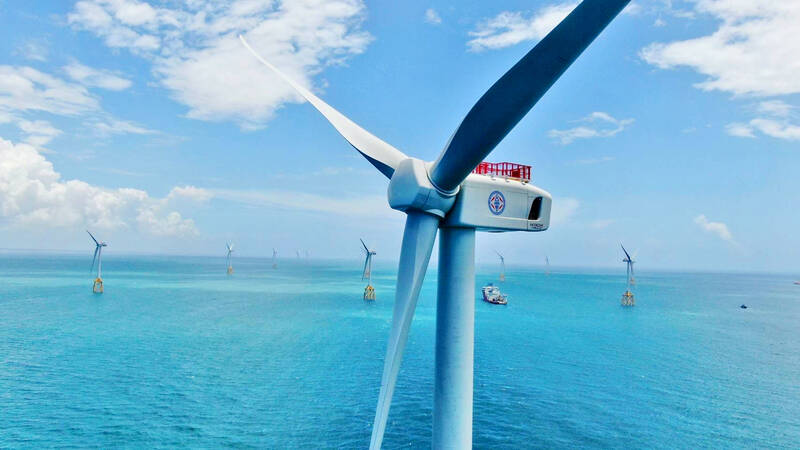Japanese companies are dropping out of offshore wind projects in Taiwan, one of fastest-growing markets for the technology, as rising costs and worsening delays plunge the industry into deeper trouble worldwide.
Oil refiner Eneos Holdings Inc last week said that it might exit the Yunlin Offshore Wind Project (允能雲林離岸風廠) after regional utility Shikoku Electric Power Co decided to pull out of the same project due to delays threatening its profitability.
Electricity generator JERA Co announced that it completed the sale of its stake in Formosa 3, another Taiwanese offshore wind project, in June.

Photo courtesy of Taiwan Power Co
“The withdrawal of companies indicate that the attractive proposition of Taiwan’s offshore wind is diminishing, which might affect investor confidence in the sector,” said Diao Chenyuan (刁晨元), managing consultant for power and renewables research at Wood Mackenzie Ltd.
However, Japan’s Mitsui & Co has decided to continue investing in building offshore wind farm in Taiwan, teaming up with Canada’s Northland Power Inc, the Ministry of Economic Affairs said yesterday.
Spanish power company Iberdrola group, Blue Float Energy Co, France’s EDF group and Floatation Energy are also continuing with their plans to develop offshore wind farms, the ministry said.
Taiwan’s wind farms are part of a plan to increase the ratio of electricity coming from renewables to 20 percent by 2025, from 8 percent last year.
The nation aims to have 5.7 gigawatts of offshore wind capacity by then, compared with 2.1GW now.
Taiwan is also looking to increase its use of natural gas, cut coal and eliminate nuclear power, but is falling behind schedule on its targets.
Fewer players in the market reduces competition and leads to undersubscription in tenders, and could jeopardize Taiwan’s targets, Diao said.
The troubles in Taiwan’s wind industry compound a crisis that has already hit other parts of the world, as the aftereffects of the COVID-19 pandemic push up the cost of labor and borrowing.
While many businesses are able to offset cost changes by raising prices, many wind developments find themselves locked into contracts to sell power at rates set years ago.
Denmark’s Orsted A/S this week withdrew from a partnership developing offshore wind in Norway due to rising costs, while BP PLC and Norway’s Equinor ASA recently took large impairments on projects.
US-based public utility Eversource Energy also incurred a US$331 million after-tax impairment charge in the second quarter for its offshore wind operations.
In Taiwan, rigid requirements mandating that developers procure 60 percent of their equipment from local manufacturers have made projects even more expensive, sometimes doubling costs.
The rules could lead to a sharp rise in offshore tariffs, saddling ratepayers with higher prices and bringing delays in installations, BloombergNEF Analyst Leo Wang said in a report this month.
Less experienced suppliers in new offshore wind markets also often offer products that are more expensive than their international peers and of lower quality, he said.
Additional reporting by Lisa Wang

CHIP RACE: Three years of overbroad export controls drove foreign competitors to pursue their own AI chips, and ‘cost US taxpayers billions of dollars,’ Nvidia said China has figured out the US strategy for allowing it to buy Nvidia Corp’s H200s and is rejecting the artificial intelligence (AI) chip in favor of domestically developed semiconductors, White House AI adviser David Sacks said, citing news reports. US President Donald Trump on Monday said that he would allow shipments of Nvidia’s H200 chips to China, part of an administration effort backed by Sacks to challenge Chinese tech champions such as Huawei Technologies Co (華為) by bringing US competition to their home market. On Friday, Sacks signaled that he was uncertain about whether that approach would work. “They’re rejecting our chips,” Sacks

NATIONAL SECURITY: Intel’s testing of ACM tools despite US government control ‘highlights egregious gaps in US technology protection policies,’ a former official said Chipmaker Intel Corp has tested chipmaking tools this year from a toolmaker with deep roots in China and two overseas units that were targeted by US sanctions, according to two sources with direct knowledge of the matter. Intel, which fended off calls for its CEO’s resignation from US President Donald Trump in August over his alleged ties to China, got the tools from ACM Research Inc, a Fremont, California-based producer of chipmaking equipment. Two of ACM’s units, based in Shanghai and South Korea, were among a number of firms barred last year from receiving US technology over claims they have

It is challenging to build infrastructure in much of Europe. Constrained budgets and polarized politics tend to undermine long-term projects, forcing officials to react to emergencies rather than plan for the future. Not in Austria. Today, the country is to officially open its Koralmbahn tunnel, the 5.9 billion euro (US$6.9 billion) centerpiece of a groundbreaking new railway that will eventually run from Poland’s Baltic coast to the Adriatic Sea, transforming travel within Austria and positioning the Alpine nation at the forefront of logistics in Europe. “It is Austria’s biggest socio-economic experiment in over a century,” said Eric Kirschner, an economist at Graz-based Joanneum

OPTION: Uber said it could provide higher pay for batch trips, if incentives for batching is not removed entirely, as the latter would force it to pass on the costs to consumers Uber Technologies Inc yesterday warned that proposed restrictions on batching orders and minimum wages could prompt a NT$20 delivery fee increase in Taiwan, as lower efficiency would drive up costs. Uber CEO Dara Khosrowshahi made the remarks yesterday during his visit to Taiwan. He is on a multileg trip to the region, which includes stops in South Korea and Japan. His visit coincided the release last month of the Ministry of Labor’s draft bill on the delivery sector, which aims to safeguard delivery workers’ rights and improve their welfare. The ministry set the minimum pay for local food delivery drivers at